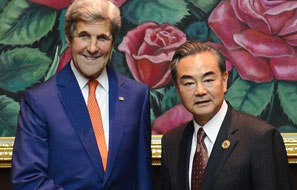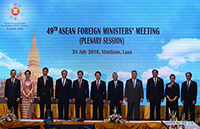SINGAPORE - Singapore oil field services firm Swiber Holdings Ltd filed an application to wind up the company and said a Singapore court had appointed provisional liquidators, making it the biggest local name to fall victim to the slump in oil prices.
In a statement to the Singapore Exchange, Swiber said the hearing to wind-up the company has been set for August 19. Swiber, which operates a fleet of 51 vessels, did give any specific reason for the move but said it was facing letters of demand for US$25.9 million (S$34.9 million) and had warned earlier this month of delays in raising US$200 million in preference shares.
Local oilfield services companies have been burdened by weak oil prices, which have strained their liquidity, with charter rates tumbling and clients either delaying or cancelling projects. "If highly leveraged offshore and marine companies are unable to raise capital from equity markets, then they will be left with very little other options other than to file for liquidation or for judicial management," said Joel Ng, an analyst at KGI Fraser Securities.
Over the next year-and-a-half, bonds totalling nearly S$1.2 billion from energy and offshore marine issuers in Singapore will mature, with S$615 million due over the next five months, according to IFR, a Thomson Reuters publication.
Another firm, Technics Oil & Gas Ltd, and its unit were placed under judicial management this month.
Investors had turned more positive on Swiber after it redeemed two bonds in June and July totalling S$205 million.
Swiber said this month a preference share sale agreement for US$200 million had been delayed and that it was seeking legal advice. But a flood of letters of demand, including statutory demands, had flowed in since Monday, claiming a total US$25.9 million, as of July 26, adding more pressure on the company.
Swiber said some of its executive directors, including its chief financial officer, had resigned.
From just 10 vessels in 2006, Swiber has expanded to own and operate a fleet comprising 38 offshore vessels and 13 construction vessels. It has more than 2,700 employees across Southeast Asia and other countries, according to its website.
Swiber's longest dated bond due 2018 started falling sharply in mid-March. The provisional liquidators of the company, which has a market value of S$50 million, have asked for trading in Swiber's shares to be suspended.
The High Court of Singapore appointed KordaMentha Pte Ltd's Cameron Lindsay Duncan and Muk Siew Peng as the joint and several provisional liquidators of the company.
Sources: Reuters
Swiber to wind up, biggest Singapore casualty of oil slump | Reuters
Slump in oil prices affects S’pore lenders
 Feeling the heat: OCBC’s total oil and gas exposure was US9.32bil, nearly half of which to the offshore oil services segment. – Reuters
Feeling the heat: OCBC’s total oil and gas exposure was US9.32bil, nearly half of which to the offshore oil services segment. – ReutersBanks hit by poor demand for loans from oil and gas sector
SINGAPORE: Two of Singapore’s top banks flagged mounting concerns about loans to the oil and gas sector, on the same day that a prominent local oilfield services firm announced it was winding up, under the weight of crushing debt.
The dour outlook from Oversea-Chinese Banking Corp and United Overseas Bank, Singapore’s second- and third-largest lenders by assets, respectively, came as Swiber Holdings said it had filed for liquidation, making it the biggest local name to fall victim to the slump in oil prices.
OCBC and UOB, along with Singapore’s No.1 lender DBS Group Holdings, have long maintained prudent lending standards and adequate capital levels to become some of the safest banks in the world.
But oil’s 60% slump over the past two years is beginning to impact them, as the lenders’ main activity is centred on South-East Asia, a region for which oil and gas is a key industry. Banks are being hit by both poor demand for loans from the sector and by more loans turning sour.
“The loan demand is very weak,” OCBC CEO Samuel Tsien told a quarterly earnings briefing, adding that the oil and gas services sector continues to be under pressure.
“Our distressed indicators for this portfolio continue to deepen, but have not broadened,” Tsien said.
Over the next year-and-a-half, bonds totalling nearly S$1.2bil (US$881mil) from energy and offshore marine issuers in Singapore will mature, with S$615mil due just over the next five months, according to IFR, a Thomson Reuters publication.
OCBC’s total oil and gas exposure was S$12.6bil (US$9.32bil), nearly half of which to the offshore oil services segment.
UOB expected that over the next one to two years the key concern for the bank would be companies in the oil and gas sector, its CEO Wee Ee Cheong told a briefing,
OCBC posted a 15% drop in quarterly profit, hit by lower insurance income, though UOB surprised with a 5.1% jump in earnings on higher trading income.
However, net interest income was weak at both banks, which also saw bad-debt provisions climb.
OCBC said its customer loans contracted 2% from a year ago due to lower trade loans and reduced offshore borrowings of Chinese companies due to more favourable onshore borrowing rates in China.
Shares of UOB were down 1.6% in late afternoon trade, while OCBC fell 0.6 percent. Shares of DBS, which will report results on Aug 8, were down 2.6%. – Reuters
Related posts:
Apr 6, 2016 ... Some think it will be years before oil returns to $90 or $100 a barrel, a price that
was pretty much the norm over the last decade. Credit Michael ...

Sep 30, 2015 ... Many oil majors have announced job cuts to manage costs that had spiralled
upwards during the boom days in the industry. Oil majors now ...

Nov 23, 2014 ... Malaysia's economy is very much dependent on the oil and gas sector. ... One
notable impact of falling crude oil prices is on the government's ...
rightways-tan1.blogspot.com
Dec 2, 2014 ... PETALING JAYA: With the oil and gas (O&G) sector being the hardest hit in the
current market rout, tycoons who own significant stakes in these ...
rightways-tan1.blogspot.com












